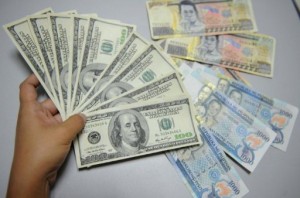Peso seen at 45.50 to $1 in Q1
MANILA, Philippines—The peso is expected to trade at 45.50 to the dollar in the first quarter of 2012 as it fails to resist the current of eroding legal tender in Asia, according to DBS Group.
In its latest quarterly report on the global market outlook, the Singapore-based group said the local money “is unlikely to buck the trend of weaker Asian currencies” next year despite a relatively strong showing this year.
“The peso has been resilient compared with many of its Asian peers ever since the European Union’s sovereign debt crisis hit the region,” the financial services group said.
“This could be partly attributed to the fact the peso-dollar exchange rate did not follow its counterparts in trading to a new low after the global financial crisis of 2008-2009,” it added.
DBS said the Philippines, although not immune to the European crisis, was in a “fundamentally stronger” position compared with when it faced the global crisis three years ago.
“When the EU crisis hit the Asian region last September, [the Philippines] did not experience a material drop in foreign reserves like its peers,” it said. “In fact, reserves recovered to a new high in [November].”
Preliminary data from the Bangko Sentral ng Pilipinas show that the country’s gross international reserves reached a record high of $76.3 billion as of the end of November.
The feat was attributed mainly to the BSP’s income from investments abroad, foreign exchange operations, foreign currency deposits and the revaluation of the central bank’s gold holdings.
The BSP said the reserves were equivalent to 10.7 times the country’s short-term external debt based on original maturity.
“Reserves have been exceeding external debt since end-2010,” DBS said, noting that the Philippines was working toward achieving an investment grade rating after having enjoyed sovereign debt ratings upgrades from Moody’s Investor Service and Fitch Ratings last June.
“To cushion the economy from the global slowdown, the government is likely to increase fiscal spending while BSP joins other Asian countries in easing monetary policy,” DBS added.
